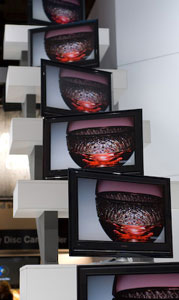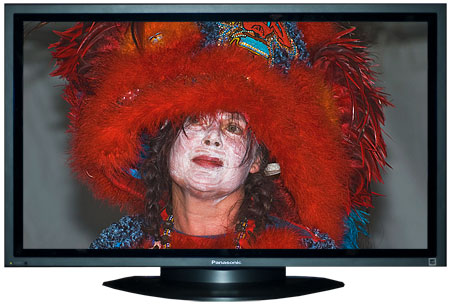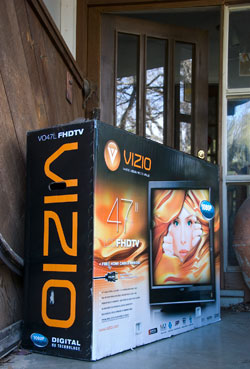've seen those blank stares when I walk into the television section of a consumer electronics store. There you are - assaulted by a wall of HDTVs all playing the same program. And for the life of you, all those flat screens look very seductive, but still pretty much the same. How do you decide? Where do you begin?
It's easy to become flustered in the presence of this chorus line of sexy, beautiful models with their thin bezels and full HD measurements. If you begin to hyperventilate, just imagine their parents, those chunky boxes with knobs sticking out.

So let's start with this simple statement. It's a TV. Nowadays, they are bigger and flatter then they were in the 20th Century. They are preceded by HD, but they're still televisions.
Whether you grew up watching The Honeymooners or Moonlighting, Bonanza or Buffy the Vampire Slayer, you probably have purchased one or two TVs in your life. Buying this high definition television shouldn't be any different.
It's a TV. And despite all the technological mumbo-jumbo, how you decide on what HDTV to buy really isn't any different than it was ten or twenty years ago.
All of us want to think that we are making a wise, informed choice and are getting our money's worth. So let me discuss a few factors that you may wish to consider.
High Definition vs. Standard Definition
Before we begin, we need to establish a couple of basic terms. The HD in HDTV stands for high definition. In comparison, those old boxy TVs that we grew up with are standard definition, (SD), though they were never called that because there was no HD.
Without be too technical or exact, the picture that we see on a TV screen is made up of thousands of little dots called pixels. SD TVs use fewer pixels to create a picture, which means less detail – or definition – than an HDTV. More definition translates to a sharper, cleaner, finer image - a "honey come look at this" humdinger of a picture.
 |
| Representation of 1080p, 720p & 480i - More Pixels = Sharper Image |
Definition for TVs is stated in terms of resolution. When you go shopping, you will probably run across these two common resolution numbers, 720p and 1080p. As you would guess, a 1080p TV uses more pixels than a 720p TV. Both are considered high definition TVs. (For comparison, standard definition is usually stated as 480i or 480p. I don't even want to get into i, interface, and p, progressive.) I will discuss resolution as a factor in choosing a TV later.
To an extent, buying TVs in 2008 is easier than it used to be because almost nobody makes standard definition TVs anymore. If you go into a store, you really have to search for them. So if you are buying a new model TV, about your only choice is an HDTV. In a couple of years, we will simply drop the HD tag and go back to calling them TVs.
Picture Quality – Minding Your P's & Q's
For me, the foundation for judging any HDTV is picture quality, which cannot be reduced to one characteristic like sharpness or contrast or color. Picture quality is a combination of all those and more. It's the gestalt.
When you experience great picture quality, you'll nod your head and think, "Damn, that's what all this hubbub about HDTVs is about."
The problem is that picture quality is subjective. For example, I'm particularly sensitive to overly colorful skin tones, so a pleasing picture to me may seem way too desaturated to you.
 |
| Panasonic TH-42PH10UK 42" Plasma |
In my reviews, I will give you my opinion about a TV's picture quality, but you're the one that has to live with your choice. And the real fly in the ointment is that it is really difficult for you to judge a TV's picture quality by strolling through the HDTV aisles in a big box store – even harder online.
If you can, I would suggest that you carry your favorite DVD with you and find a store that you can play it on a few TVs. If nothing else, get your mitts on the remote control and take the TV for a spin around the Setup menu. I know that idea causes dread in the hearts of salesmen; but if you are seriously shopping, then they should be glad to help.

One last thing before we move on. This is a guide. I will not tell you which specific HDTV to buy. There are way too many HDTV models out in the marketplace and I only feel comfortable recommending TVs that I have reviewed. If you want specific suggestions from me, look for the Highly Recommended logo on a review.
Price
Let's continue this HDTV Buying Guide with what is often the major consideration in buying an appliance – cost. For most of us mere mortals, we need to decide how much we want to spend. Without some dollar limit, strolling into the HDTV section of the store (whether brick and mortar or online) can lead to a major household budget buster.
I'll discuss price of TVs in terms of screen size, screen type, and screen resolution in the following sections. For now, let's talk about cost, near term and long term. Beyond the price of the TV, before you leave the store you will be accosted with a few other expenses that you should factor in – cables, wall mounts, transportation, installation, and warranties.
Rather than dive into a long discussion on cables or wall mounts at this point, please see the Accessories section at the end of this article.
 |
| Big Box Delivery |
If you are buying at the local big box store down the freeway, you will have to transport that lovely toy to your house. And if we're talking about any screen much larger than 32", its box probably won't fit into your Prius. It may not even squeeze into your Escalade. Hopefully, you have a good friend with a strong back and a cargo van.
If not, you may want to consider using the store's delivery and installation service. Often installation is priced reasonably and packaged with the TV as an incentive. Do the math, only you can to decide if it is worth it.
Of course, if you are purchasing online, then shipping to your door will be calculated into the final price. Unless it is otherwise stated, don't be surprised if the delivery man tells you that there will be an extra charge for maneuvering the box into your TV room or upstairs into the bedroom.
Most retailers will try to sell you a warranty that can amount to a sizeable chunk of change. The general consensus is that warranties are not a great idea when it comes to TVs. You can read more about warranties in an article. "What's with Warranties?"
Finally, depending on your disposition, when you are buying a big ticket item like an HDTV, negotiation opportunities may arise. With intense competition, the profit margins for retailers on the TVs are fairly thin, but you may find some wiggle room, especially on prices for warranties and installation.
Now, once you have your HDTV home safe and sound, you still have one more cost that can be substantial over the long term – HD content.

No comments:
Post a Comment